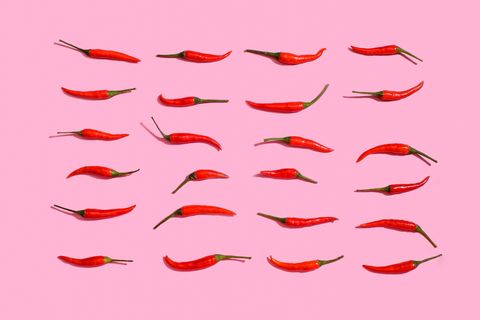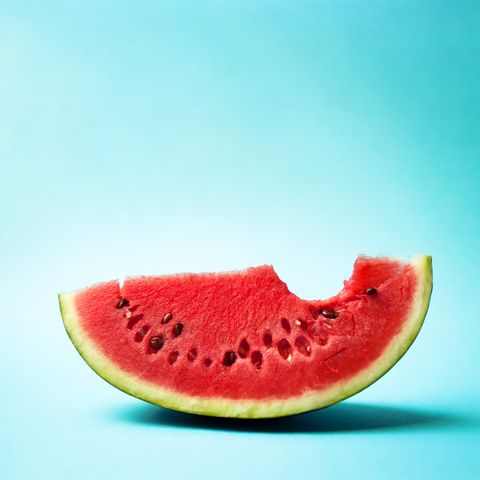Healthy and Easy Way to Lose Weight
Lose 5 pounds in one week! It's a trope we see everywhere, and if you're someone who needs to drop some weight for health reasons or simply want to for yourself, it can sound pretty enticing. Technically, it's possible for some people to lose that much in that time period, but it's not something our nutrition experts recommend, and it's definitely not a healthy approach. Even though you might have lost that much on a low-carb or keto diet (which may be mostly water weight), y ou'll likely gain it all back as soon as you decide it's time to eat carbs again. Plus, since weight loss in general is highly dependent on your metabolism and loads of other factors unique to you, including physical activity and body composition, that promise won't hold true for everyone.
If you're still looking to lose weight, there are a few healthy tips that hold true for almost all of us across the board — and they're concepts that we can put into practice beginning right now.
Editor's note: Weight loss, health and body image are complex subjects — before deciding to go on a diet, we invite you gain a broader perspective by reading our exploration into the hazards of diet culture.
How to Lose Weight Safely
1. Up your veggie intake.
Instead of restricting different foods and food groups, focus on incorporating an abundance of nourishing foods that you can add into your diet to promote overall health and weight management. The water and fiber in produce adds volume to dishes and are naturally low in fat and calories but nutrient-dense and filling. You can create lower-calorie versions of delicious dishes by swapping out higher calorie ingredients for fruits and veggies. If you think about making any meal mostly veggies (at least 50% of anything that you're having), you're on the right track to better health.
2. Build a better breakfast.
A balanced breakfast — one that is stacked with fiber, protein, healthy fats, coming together in a delicious dish — will revolutionize your day, especially if you are currently skipping it and still find yourself struggling to prioritize a healthy lifestyle. Skipping breakfast may influence your hunger hormones later in the day, leading to you feeling "hangry" in the afternoon which makes it harder to refrain from oversized portions or cravings for sugary and refined carbohydrate foods. The best, heartiest breakfasts are ones that will fill you up, keep you satisfied, and stave off cravings later in the day. Aim to eat anywhere between 400 and 500 calories for your morning meal, and make sure you're including a source of lean protein plus filling fat (think eggs, unsweetened Greek yogurt, nuts, or nut butters) and fiber (veggies, fruit, or 100% whole grains). Starting your day with a blood sugar-stabilizing blend of nutrients will help you slim down.
3. Snack smart.
Many popular snacks today aren't nutrient-dense but are high in calories. Major culprits often come in the form of refined grains like cereals, chips, crackers, and cookies but also calorie-packed drinks like juice and soda. Try to keep snacks under 300 calories for weight loss and aim for healthy snacking choices with at least 4 grams of fiber and 4 grams of protein to fill you up. Choose picks that are ideally low in added sugar and sodium too.
4. Eat mindfully.
Slowing down to focus on things like the taste, textures, temperature, and smells of what you're eating can help with portion control. But mindful eating also means really focusing on what you're eating and when—this can help you identify unnecessary munching moments you may not realize you're engaging in throughout the day that may be tacking on extra calories. More importantly, try to avoid eating foods that you don't choose for yourself. Mindful eating can help shift the focus of control from external authorities and cues to your body's own inner wisdom. Noticing where your extra calories actually come from is another step to making better choices in the short and long term.
5. Skip sugary beverages.
We just don't feel full by liquid calories in quite the same way as we do real food. Drinking a juice or caramel coffee drink just isn't as satisfying as eating a bowl of veggie- and protein-packed stir-fry. Skipping sugary beverages is often the easiest way to lose weight faster, and bonus, it's good for things like heart health and diabetes prevention too. So monitor your intake of juice, soda, sweetened coffee and tea and alcoholic beverages. If you consume each of those beverages during the day, you'll have taken in at least 800 extra calories by nighttime — and you'll still be hungry. (Incidentally, alcohol may suppress the metabolism of fat, making it tougher for you to burn those calories.)
6. Start strength training.
Strength training builds lean muscle tissue, which burns more calories — at work or at rest — 24 hours a day, seven days a week. The more lean muscle you have, the faster you'll slim down.
How do you start strength training? Try some push-ups or a few squats or lunges. Use your free weights to perform simple bicep curls or tricep extensions right in your home or office. Mix in some new ab, arm, back and leg moves if you like. Strength training just three to four times per week can lead to rapid improvement in not only weight loss, but also range of motion, stability, and posture.
7. Spice up your life.
Spicy foods can actually help you cut back on calories. That's because capsaicin, a compound found in jalapeño and cayenne peppers, may (slightly) increase your body's release of stress hormones such as adrenaline, which can speed up your ability to burn calories. What's more, eating hot peppers may help you eat more slowly and avoid overeating. You're more likely to stay more mindful of when you're full. Some great choices besides hot peppers: ginger and turmeric.
8. Go to bed earlier.
There's a ton of research that demonstrates getting less than the desired amount — about seven hours — of sleep per night can slow down your metabolism. Chronic sleep deprivation may even alter hormones that control hunger, and some studies show that there is a connection between poor quality food choices and less sleep. Good sleep has a ton of other benefits too, like boosting alertness, improving mood and overall quality of life. So don't skimp on your ZZZ's, and you'll be rewarded with an extra edge when it comes to overall health and losing weight. Start small with just pushing up bedtime by 15 to 30 minutes, every minute counts!
9. Keep a food journal.
People who log everything they eat — especially those who log while they're eating — are more likely to lose weight and keep it off for the long haul, studies consistently indicate. The habit also takes less than 15 minutes per day on average when you do it regularly, according to a 2019 study published in Obesity.
Start tracking on an app like MyFitnessPal or use a regular notebook. It'll help you stay accountable for what you've eaten. Plus, you can easily identify areas that could use a little improvement when it's written out in front of you.
10. Take a walk!
Walking can be a very useful weight management tool, as it can help maximize your NEAT (an abbreviation for Non-Exercise Activity Thermogenesis), which is essentially the energy expended for anything besides formal exercise and sleep. If you are walking for weight loss, NEAT can be a great tool for helping you achieve your goals. Research even shows that walking is decreased in obese individuals and also declines with weight gain.
Exercising at any time is good for you, but evening activity may be particularly beneficial since your metabolism typically slows down towards the end of the day. Thirty minutes of aerobic activity before dinner increases your metabolic rate and may keep it elevated for another two or three hours, even after you've stopped moving. Plus, it'll help you relax post-meal so you won't be tempted by stress-induced grazing that can rack up calories.
11. Resist the urge to skip a meal.
Our nutrition experts stress that skipping meals will not make you lose weight faster. If a hectic day makes a sit-down meal impossible, stash a piece of fruit and pack of nut butter in your car or purse and keep snacks in your desk drawer — anything that will keep you from going hungry!
Going long periods of time without food does double-duty harm on our healthy eating efforts by both slowing down your metabolism, and priming you for a binge later in the day. Make it your mission to eat three meals and two snacks every day, and don't wait longer than three to four hours without eating. Set a "snack alarm" on your phone if needed.
12. Eat your H2O.
Sure, drinking plenty of water can help combat bloating, but you can (and should!) also consume high-water content foods. Reach for cucumbers, tomatoes, watermelon, asparagus, grapes, celery, artichokes, pineapple, and cranberries — all of which contain diuretic properties that will also help you stay full due to their higher fiber content.
13. Munch on mineral-rich foods.
Potassium, magnesium and calcium can help to serve as a counter-balance for bloat-inducing sodium. Foods that are rich in potassium include leafy greens, most "orange" foods (oranges, sweet potatoes, carrots, melon), bananas, tomatoes, and cruciferous veggies — especially cauliflower. Low-fat dairy, plus nuts, and seeds can also help give you a bloat-busting boost. They've also been linked to a whole host of additional health benefits, such as lowering blood pressure, controlling blood sugar, and reducing risk of chronic disease overall.
14. Let yourself off the hook.
When it comes to healthful eating, moderation is the key to fueling your body with nutritious foods and maintaining a healthy weight for the long haul. So rather than beating yourself up for eating foods you think you think you shouldn't, let it go. Try to remember food should be joyful.
15. Look for our emblem on food labels.
Ultimately, long-term weight loss requires some short-term behavior change and healthier habit formation. That's why we created our Good Housekeeping Nutritionist Approved Emblem, which exists to help turn smart food choices into healthier eating habits. All GHNA foods and drinks make it easier to find — and eat — good-for-you foods without additional time, effort, and cost. We target the lifestyle-related factors that make healthier eating hard, and find simple but creative solutions that actually work! Look for the emblem on labels wherever you shop for food.
This content is created and maintained by a third party, and imported onto this page to help users provide their email addresses. You may be able to find more information about this and similar content at piano.io
harrickssoments62.blogspot.com
Source: https://www.goodhousekeeping.com/health/diet-nutrition/advice/a17162/lose-weight-faster-karas-0302/



